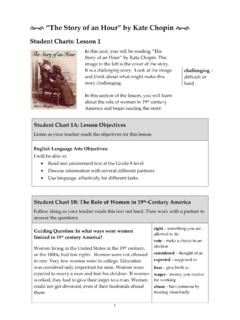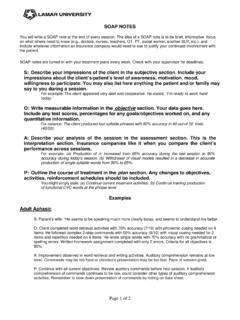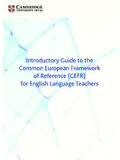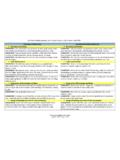Transcription of Academic Language for English Language Learners
1 Academic Language for English Language LearnersFeaturingDr. Robin Scarcella, University of California at IrvineHosted byDelia Pompa, National Council of La RazaAvailable on demand | is Academic Language ? Academic Language is: the Language used in the classroom and workplace the Language of text the Language assessments the Language of Academic success the Language of powerWhy is Academic Language so important? Students who master Academic Language are more likely to: be successful in Academic and professional settings Students who do notlearn Academic Language may: struggle and drop out of schoolAcademic Language in action writing example by a university ESL studentLetter #1: Before Academic Language InstructionDear Mrs.
2 Robbin,I really not need humanity 20 writing class because since time I come to United State all my friend speak Language . Until now everyone understand me and I dont need study Language . I don t know Vietnam Language . I speak only English . I have no communication problem with my friend in dorm. My English teacher in high school key person to teach teacher explained to me that how important the book was for the student and persuaded me read many book. I get A in English through out high school and I never take ESL. I gree that some student need class but you has not made a correct decision put me in English class. Please do not makes me lose the face. I have confident in Language in action (cont.)
3 Writing example by a university ESL studentLetter #2: After Academic Language InstructionHi Robin, I am apologize for having to send you this information at the last minute. I still need a letter. This letter should discuss my qualifications, skills and accomplishments. It should be written on letterhead and addressed To Whom It May Concern and submitted with a Recommendation Form (which I will give to you tomorrow).Please write a letter that addresses my Academic achievement, seriousness of purpose, personal maturity, and whether or not I possess the skills necessary to adapt to a new environment. Also, please address my ability to think analytically, my aptitude, my overall maturity and my independence.
4 Thank you so much Robin for doing this for me. I truly appreciate it. Let me know if you have any last minute difference between social and Academic Language When using social, or informal, English in daily conversation, it s possible to communicate by using slang and without using English in a grammatically correct way. You can be understood without using: articles prepositions sophisticated vocabulary pronoun referenceDo students need to first master social Language ? In the United States, we tend to teach informal survival English first and then Academic Language . However, it is possible to lay the foundation for Academic Language while teaching conversation social v.
5 Academic languageSome of the differences between social and Academic Language that students should look for include:Informal LanguageAcademic Languagerepetition of wordsvariety of words, moresophisticated vocabularysentences start with and and but sentences start with transitionwords, such as however, moreover, and in addition use of slang: guy, cool, and awesome No slangActivity Idea:Recognizing social v. Academic students a passage using Academic Language , and a passage using informal the passages in groups or with a groups write and discuss the differences between the kinds of languages used, practicing with difference this exercise with numerous passages until students are able to recognize the differences between social and Academic Language in oral expression Academic Language is also a part of speaking Mastering oral Academic Language will allow students to participate in: Academic discussions debates presentations in front of their peersActivity Idea.
6 Practicing oral Academic students to speak in front of others by teaching them Academic words and grammatical features that would be used in a presentation, such as: The topic of my presentation First, I will provide some background information In Are there any questions? Activity Idea:Practicing oral Academic Language (cont.) students in to pairs so they can practice these expressions together before doing an oral presentation. Helping students prepare for presentations will increase their confidence and give them more opportunities to practice using their Academic Academic Language in a student s native Language If students have acquired Language in their first Language , they will be able to acquire Academic Language much more quickly in their second languageAt what age should Academic Language instruction begin?
7 Preschool through 3rdgrade students need to learn age-appropriate vocabulary and Language that will give them a strong foundation for Academic Language in the future 4thgrade through 8thgrade instruction should transition in order to teach students more sophisticated Academic Language skills, including vocabulary and grammatical structuresNote: Formal Academic Language instruction should begin in what age should Academic Language instruction begin? (cont.) 9thgrade through 12thgrade students need to know a large vocabulary of Academic words used across Academic disciplines, and they need to have access to and use more complicated grammatical structuresNote: Formal Academic Language instruction should begin in for young children What does age-appropriate instruction look like for young children?
8 Young children are eager to learn new words and participate in conversation they don t need to learn skills learned by older students yet, such as literary analysis however, teachers of young students can build a foundation for future Academic Language skillsInstruction for young children (cont.) Example: Show and organizing a Show and Tell session, teach young children the phrase: I m going to share an experience I had. this phrase, children learn two new words: share rather than tell or talk about experience Linguistic concepts and Academic Language Academic Language includes many areas of Language : phonology and spellingExamples:Anthropology v.
9 AnthropologicalMorphology v. morphologicalmanipulate v. manipulation Although these words are closely related and look very similar, they have spelling and pronunciation differences that may be confusing to English Language concepts and Academic Language (cont.) vocabularyExample: anthropologyTeaching word 3 student a sentence using the target word from their about how it is up new sentences using the students practice using the word with that some students need more practice that others to use Language accuratelyLinguistic concepts and Academic Language (cont.) Other areas of Academic Language components: parts of speech prepositions sentence agreement verb tenses modalsNote: This list was adapted from Dr.
10 Scarcella s interview for the Doing What Works websiteLinguistic concepts and Academic Language (cont.) components: how to use different genres with different audiences, such as explanation, summarization, persuasion, or components how to appropriately start, continue, and end discourse, as in a conversation or an essayNote: This list was adapted from Dr. Scarcella s interview for the Doing What Works websiteChoosing what to teach in Academic Language instruction When teaching reading and choosing passages, teachers should identify words that students will have difficulty understanding and will determine student s ability to comprehend text These words may be an Academic word (such as stimulate ), a grammatical structure ( ), a preposition ( between ), an adverb (hardly), or a conjunction ( and ) Academic Language and word usage When teaching new vocabulary, it s important to be very specific on word forms and usage Example.












